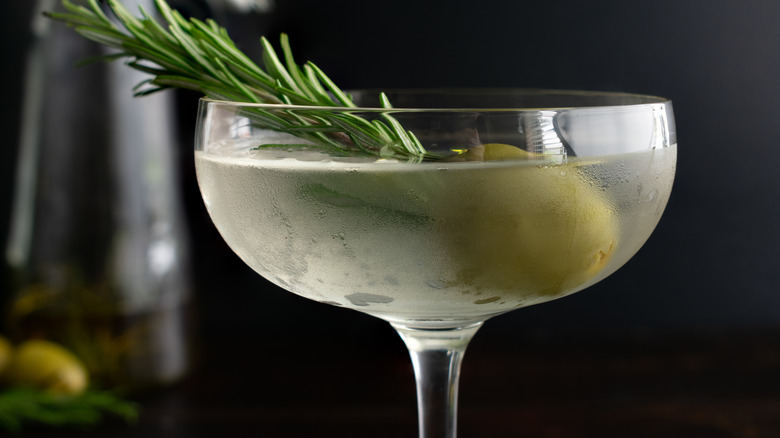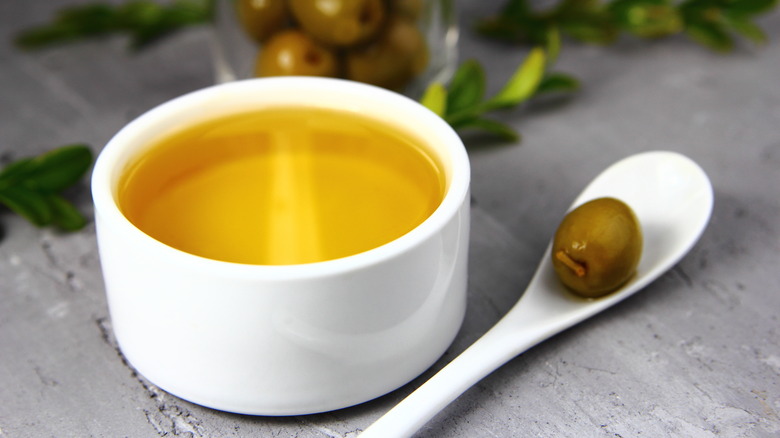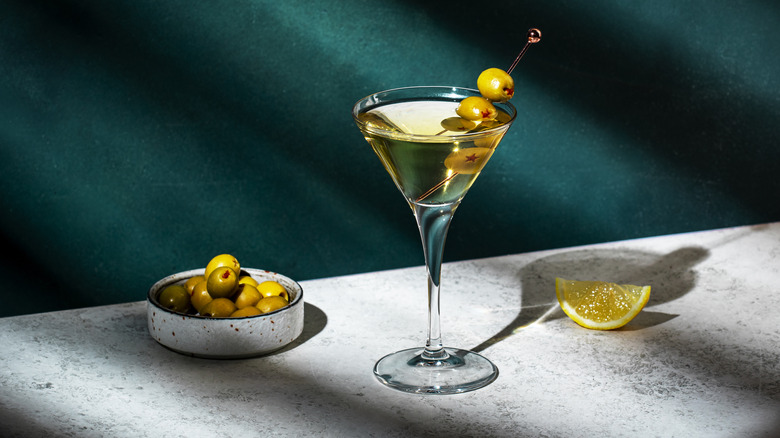Give Your Martini A Total Flavor Upgrade With Olive Oil
Olive oil is arguably one of the most versatile ingredients in your kitchen. From frying to sauteing, salad dressing to toast topper, from meals to snacks, and even desserts like olive oil cake, you can almost never have too much of this dream ingredient on hand.
But perhaps there is one area of your at-home food and beverage program that's underserved when it comes to olive oil. When you get to the end of your day and head to the bar cart for a cocktail, you may reach for the jar of olives to add a garnish or even pour out a little of the brine to dirty up your drink, but the oil itself is probably still in the pantry.
But martini drinkers, don't bypass that bottle. Because if you're not putting olive oil in your cocktail, you're missing an opportunity to significantly upgrade your drink's flavor and texture.
What is an olive oil martini?
There's a cocktail technique referred to as "fat washing," and it describes a process of infusing your liquid with a lipid. Essentially, it's a way to transfer the flavor from your chosen fat to your cocktail. By combining your oil with your base spirit, shaking them together, and then freezing this mixture (for at least 24 hours, if possible), the oil rises to the top and firms up. You can then remove this fat layer while leaving behind its flavorful essence. It is this cocktail alchemy that makes the olive oil martini possible.
This method works for everything from bacon to butter (both of which are especially good with brown spirits like bourbon or aged rum), but when it comes to a clean, crisp, and ice-cold martini, olive oil was made for the job. The flavor spectrum that different olive oils bring to your glass can range from fruity to peppery, floral to herbaceous, sweet to bitter, and just about everything in between. Given that the best martini recipe — made from a base spirit (gin or vodka) and vermouth — is relatively neutral, it's a beautiful stage to showcase your selection of olive oil.
Olive oil martini inspiration
While the caprese martini is basically a salad in a glass, this is a subtle, restrained cocktail by contrast. And yet, as simple as this preparation is — featuring only the fat-washed spirit and vermouth — it's a perfect framework to get creative.
If you're in the gin camp, you can work on pairing your oil choice with a type of spirit that centers on different botanicals. Some gins are juniper-forward and might benefit from a fruity pairing, as the juniper berry is an excellent match for flavors like dried fruit or apple. Juniper also has a bit of its own citrus character, so you can also opt to lean into that character with a citrus-infused oil like Blood Orange or another complementary flavor like ginger. The range of botanicals for varying gins can include everything from rosemary to lavender to spices like cinnamon, so you can tinker with different combinations to find a signature profile.
On the other hand, vodka tends to be a bit milder in flavor, allowing you to highlight your chosen oil. You'll find profiles vary from different points of origin, too, so you can experiment with Greek, Italian, Spanish, or domestic olive oils, each of which has a particular terroir. You can also use this base formula to match a mood. Try a chili-infused olive oil for a little kick, or even combine oils for a bit of taste layering, deepening complexity and, ultimately, upgrading your classic martini.


